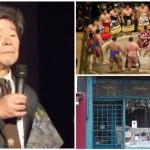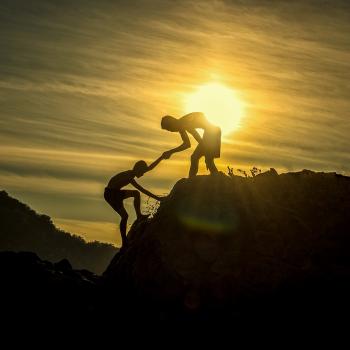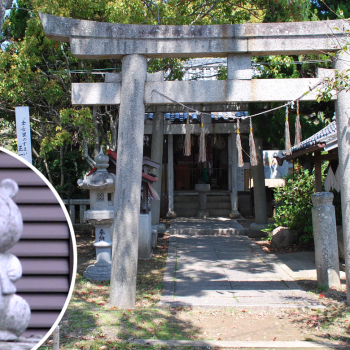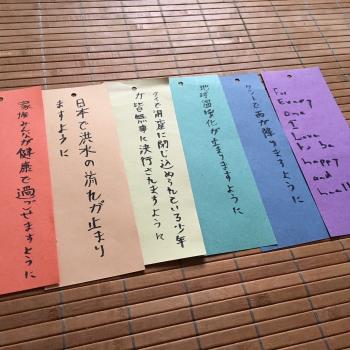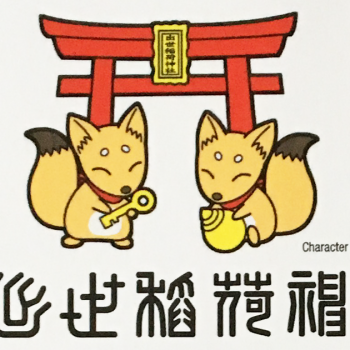Recent incidents in the sumo world have opened discussion about religious prohibitions against women in Japan.
Last July I raised the issue of discrimination of women within Shinto, brought to light by a sacred island where women are banned being given UNESCO World Heritage Status.
In that story, I mentioned that despite the most important deity in Shinto being female, and that evidence suggests women historically held high ranks in ancient Japanese religion, women are unable to participate to the same extent in Shinto as men today. A common reason given is that women are “impure”, because they menstruate.
This week, traditional Shinto attitudes became a central discussion point in the world media when women broke a taboo – by entering a sumo ring to help save the life of an elderly man.
Sumo and Shinto
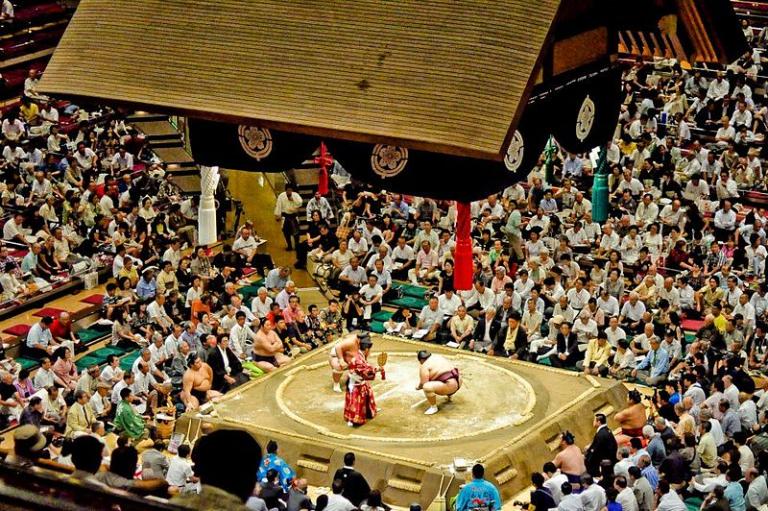
Before each fight, sumo wrestlers will perform ritual actions to honour the gods and purify the ring. A champion sumo wrestler, or yokozuna, wears a shimenawa around his waist. The shimenawa is the rope often seen at Shinto shrines and tied around natural objects like rocks and trees to denote the presence of kami. The wearing of a shimenawa by a yokozuna symbolises that he is touched by the divine.
One of the most prominent indicators of Shinto’s importance in sumo is the sumo ring itself, or dohyō. It’s even topped with a roof resembling that of a Shinto shrine. Being a sacred space, it is considered important to keep the dohyō ritually pure. Before a fight takes place, wrestlers will repeatedly scatter salt in the dohyō; an act of ritual cleansing, just as it is in many forms of western Paganism.
And this is where the taboo against women comes in. It’s believed that women contaminate the dohyō, so they are forbidden from entering.
“Ladies, please exit the sumo ring.”
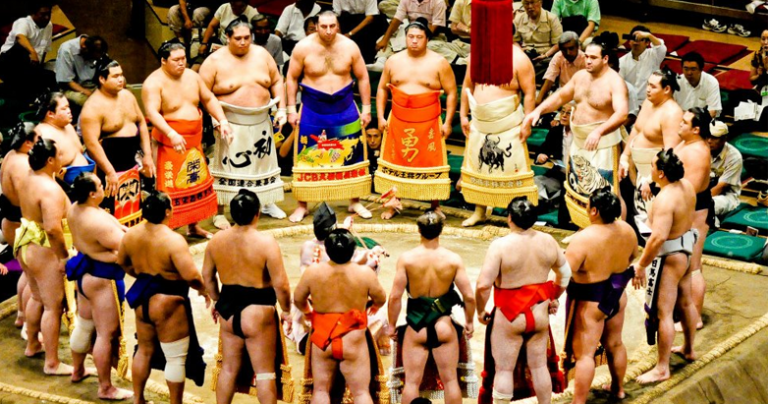
On Wednesday, 67 year old mayor Ryozo Tatami gave a welcome speech in the dohyō before a sumo match at Maizuru Culture Park Gymnasium, when he suddenly collapsed. Immediately, a group of women rushed into the ring to give first aid and perform CPR. But within seconds, an announcer said repeatedly through the PA system, “Josei no kata wa dohyo kara orite kudasai,” or “Ladies, please exit the sumo ring.”
The incident was caught on film and shared widely on the internet, provoking outrage from commentators in Japan. SoraNews24 reported some of the comments:
“Unbelievable.”
“Disgraceful.”
“So if the paramedics on-scene were women, were they just supposed to leave him to die?”
“Putting the sanctity of the ring ahead of a person’s life. Sumo is supposed to be religious, but do they think the gods will be happy with this sort of behaviour?”
“No matter what the circumstances, saving a person’s life should come first.”
The BBC also reported that spectators had seen officials throw salt into the ring after the women had left. Some on social media said the gesture implied that the women had “dirtied” the ring. Some of the comments given by Japanese Twitter users includes:
“How rude is it that they threw salt to cleanse the ring after the women went in?”
“This is the response to someone who tried to save a life? I think we’d better sprinkle salt on the head of the sumo association.”
The Japan Sumo Association Chairman Hakkaku issued a statement of apology following the incident:
“Today, during an exhibition at Maizuru, Kyoto Prefecture, Mayor Ryozo Tatai collapsed. We are praying for his speedy recovery.
We wish to express our deep gratitude to the women who promptly administered first aid measures. During their administration, the referee in charge of announcements repeatedly said ‘Ladies, please leave the ring.’ The referee was agitated, but nonetheless his actions were inappropriate in a life-or-death situation, and we deeply apologise.”
“Tradition is important, but it is also important to have courage and make a change.”
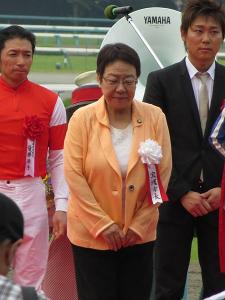
“I’m a female mayor but I am a human being,” she said, according to News18.
“But because I am a woman, despite being a mayor, I cannot make a speech in the ring. It is regrettable and mortifying.”
She added: “Tradition is important, but it is also important to have courage and make a change. I don’t care whichever side of the ring we stand, but I do want both men and women to be treated equally.”
Nakagawa is certainly not the first female to be denied entry to the dohyō on the grounds of gender.
In 1978, a 10-year-old girl advanced to the final round of a children’s sumo championship. But the Japan Sumo Association rejected her entry to the ring in the final round at the Kuramae Kokugikan, sumo’s former home arena.
Later, in 1990, Japan’s first chief Cabinet secretary Mayumi Moriyama asked the association to allow her to enter a ring to present the prime minister’s trophy. The request was rejected.
Again, in 2000, then-Osaka Gov. Fusae Ota asked the sumo association to allow her to enter the ring so she could present the winner’s cup to the champion at a local tournament. Again, her request was denied.
Nakagawa’s words were supported by Internal Affairs Minister Seiko Noda, according to ABC News. Noda said she had been rejected years ago entering a tunnel construction site due to a similar religious belief.
“That is no longer the case (at tunnels), and I expect the sumo association to appropriately respond to the recent incident and decide what steps to make,” she said.
The Future For Women And Sumo
These latest incidents, and the public outrage they have sparked, come at a time when both sumo and women’s rights in Japan are subject to scrutiny both within the nation and overseas.
Sumo continues to be rocked by internal scandals, including brutal violence against trainees, match-fixing, and links with organised crime. Far from being seen as a divine form of communion with kami, its image is becoming dark and seedy.
Meanwhile, as other developed economies surge forward in improving gender equality, Japan lags behind. In the World Economic Forum’s Global Gender Gap 2017 report, Japan comes way below the global weighted average, between Guinea and Ethiopia. Stories highlighting gender inequality in Japan regularly hit the headlines. Last week alone, in addition to the sumo incident, the international press reported that some female workers in Japan are asked to “wait their turn” to have a baby.
But perhaps change is afoot. With brave women like Mayor Tomoko Nakagawa speaking out in favour of equal treatment of men and women in sumo, it would appear that many in Japan are in the mood for reforming some aspects of sumo. And if attitudes towards women within Japan’s spiritual traditions change, this will no doubt help to improve things for women in other aspects of society too.

